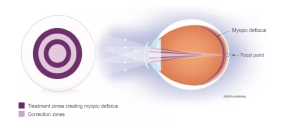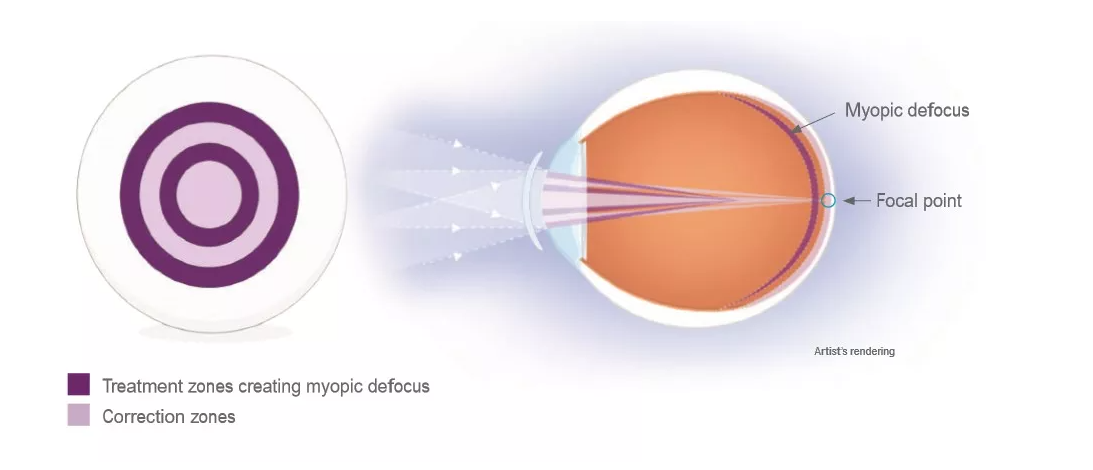The prevalence of myopia is projected to increase from approximately two billion people worldwide in 2010 to almost five billion people in 20501, bringing with it near- and long-term health challenges. In fact, the proportion of young people with myopia in the UK has more than doubled over the last 50 years, in those aged between 10–16 years and children are becoming myopic at a younger age2.
“Myopia’s growth has been dizzying, and now affects the vast majority of young adults in some countries, especially in East Asia,” said Arthur Back, Chief Technology Officer for CooperVision and a leading voice on myopia management. “Not only does it create blurred vision, but also increases the likelihood of conditions later in life such as glaucoma, cataract, retinal detachment and myopic maculopathy if not addressed.”
Innovative optical design
MiSight® 1 day daily disposable contact lens with ActivControl® myopia management technology is as easy to fit as a single-vision contact lens offering a simple convenient myopia management therapy compared with alternative treatment options.
MiSight® 1 day contact lenses control both axial length increase and myopia progression while fully correcting refractive error
Three-year clinical study summary:
- CooperVision first reported results from a three-year Clinical Evaluation of a Dual-Focus Myopia Control 1-Day Soft Contact Lens Study, at the biannual British Contact Lens Association clinical conference in Liverpool, England on 10th June 2017.
- MiSight® 1 day is a daily disposable soft contact lens that substantially slows myopia progression and eye elongation as measured by refractive error and axial length at the three-year mark3*.
- Data illustrates high satisfaction and acceptance of contact lens wear from children and their parents, rapidly overcoming initial parental apprehension3*.

Three-year clinical study findings indicated that the use of MiSight® 1 day was effective in slowing myopia progression by:
- 59% as measured by mean cycloplegic spherical equivalent3*.
- 52% as measured by mean axial elongation of the eye when compared to the children in the control group wearing a standard single-vision, one-day lens contact lens3*.
Ensuring that children wear and are happy with the lens is of critical importance to the therapy’s effectiveness. The three-year results indicated that MiSight® 1 day was well accepted by children, and did not affect their daily activities such as school work, reading, playing outside, and computer use when compared to the control group3*. Other results indicated:
- Children in both the test and control groups had a higher satisfaction with contact lenses over spectacles3*.
- Parents of study participants also had a very positive response, noting their children could mostly manage their lens wear independently.
- Prior to dispensing contact lenses, less than half of the parents were extremely at ease with their child wearing contact lenses, but this increased significantly to 79% after just one month and remained high through the three-year mark3*.
- After their children had worn MiSight® 1 day contact lenses for three years, almost 9 out of 10 parents rated their children ‘extremely happy’ with the overall experience of wearing contact lenses3*.
In conclusion, Arthur Back suggests that, “early intervention by parents, in partnership with eye care professionals, is essential for the near and long-term health and well-being of their children. The CooperVision MiSight® 1 day lens used in this study provides a new, effective and repeatable approach.”
